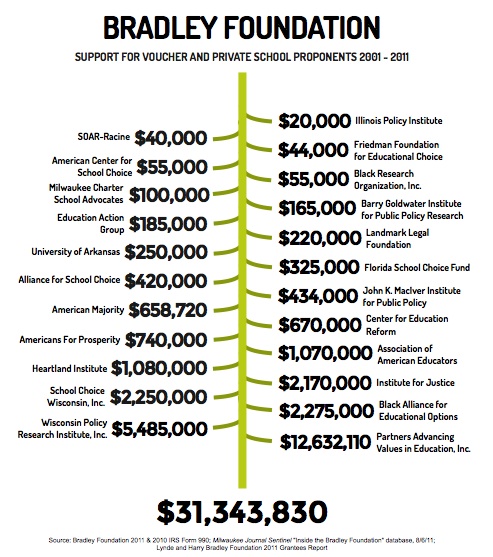Contributions* From School Voucher Supporters
To Candidates For Statewide Office And The Legislature
Name City State Employer Amount
Richard & Betsy DeVos Grand Rapids MI Alticor/Windquest $337,330
Robert & Patricia Kern Waukesha WI Generac Power Systems $302,700
John & Josephine Templeton Bryn Mawr PA Templeton Foundation $150,200
Dennis & Sandy Kuester Milwaukee WI M&I Bank $128,600
John & Christy Walton Jackson WY Walmart $122,100
Terry & Mary Kohler Sheboygan WI Windway Capital $117,875
Foster & Lynnette Friess Jackson WY Friess Associates $117,200
George & Susan Mitchell Whitefish Bay WI School Choice Wisconsin $115,500
William & Susan Oberndorf San Francisco CA SPO Partners $114,950
Jim & Lynne Walton Bentonville AR Walmart $109,600
San & Joanne Orr Wausau WI Wausau Paper $104,267
Roger Hertog New York NY Retired $100,000
Bruce Kovner New York NY Caxton Alternative Management $100,000
Howard Fuller & Deborah McGriff Milwaukee WI Marquette University/ New Schools Venture Fund $88,980
Richard & Sherry Sharp Richmond VA V-10 Capital Partners $88,300
John & Laura Fischer San Francisco CA Pisces $79,500
Virginia James Lambertville NJ Retired $67,550
Michael W. Grebe Milwaukee WI Bradley Foundation $61,700
Rex Sinquefield Westphalia MO Show-Me Institute $55,000
David & Julia Uihlein Milwaukee WI Uihlein Wilson Architects $54,900
William & Patricia Hume San Francisco CA Basic American Foods $40,400
John Bryan Lake Oswego OR Eos Inc. $35,500
David & Ann Brennan Akron OH White Hat Management $31,000
H. Fisk Johnson Racine WI S.C. Johnson & Sons $30,000
Andrew & Janice Fleckenstein Waukesha WI Fleck Foundation $27,700
Arthur Dantchik Gladwyne PA SIG Financial Holdings $24,500
Peter Denton Palm Beach FL Retired $24,100
George Hume San Francisco CA Basic American Foods $23,500
Alice Walton Millsap TX Walmart $21,950
Greg & Carrie Penner Menlo Park CA Walmart $20,000
*Table show contributors who gave $20,000 or more to statewide officeholders from 2003 through June 2012 and to current legislators and legislative leadership committees from 2003 through July 2012.
Money Behind Walker’s Voucher Expansion | Larry Miller's Blog: Educate All Students!
